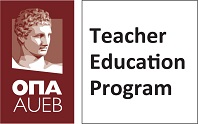NEW BOOK RELEASE: TEACHING OF FINANCE, ADMINISTRATION AND EDUCATIONAL ASSESSMENT by Dr. Vasiliki Brinia, Stamouli SA publications

NEW BOOK RELEASE: TEACHING OF FINANCE, ADMINISTRATION AND EDUCATIONAL ASSESSMENT by Dr. Vasiliki Brinia, Stamouli Publications SA
"Letters are one of the noblest exercises and one of the highest desires of man. Education is the ruler of life."
Odysseus Elytis
The new book by Dr. Vasiliki Brinia TEACHING FINANCE, MANAGEMENT AND EDUCATIONAL ASSESSMENT has been released by Stamouli SA Publications
An introduction to the contents of the book
The general picture regarding the teaching of economic sciences in secondary and lifelong education does not have the momentum it should have according to the real, long-term needs of the economy and society.
The reasons could be sought in the fact that non-active teaching methods are followed in the teaching of economic sciences, with the result that the gap that separates the student/trainee from school and real life is constantly widening.
Entire generations of students are being lost who don't love school and don't follow its prompts because they don't find ways to align their true interests and needs with what the school offers.
Today's school turns students into machines for memorizing economic concepts especially in the 3rd Lyceum for the needs of the Panhellenic Examinations, disregarding the quality of knowledge, their ability to transfer knowledge to their real world and their ability to face their real life situations.
The situation could change if there could be an essentially student-centred form of economics learning in secondary and lifelong education. The innovative teaching approaches proposed in the book emphasize the active participation of students and teachers in the teaching process, which they turn into a joyful process while at the same time emphasizing the social dimension of learning.
It is important that the teacher-economist, through his qualitative training in the pedagogy and teaching of economic sciences, activates the student in the learning process by actively and joyfully participating in the planning, organization, conduct and course evaluation. In this way, the teaching of economic sciences can be transformed into a creative process, connected to the real interests of students/learners and real life, which is the main demand of the teaching of economic sciences in secondary and lifelong education.




 76 Patission Str.
76 Patission Str.
